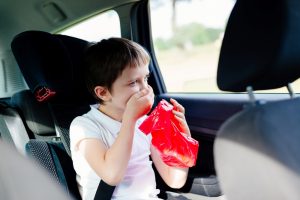Those who have experienced motion sickness can attest to just how awful it is. One minute your tweeting about how great your road trip is (from the passenger seat of course) and the next you’re feeling nauseous and dizzy.
If you’re among those who suffer from motion sickness often, understanding what it is and how to prevent may be at the top of your to-do list before the holidays.
What is motion sickness?
As the name suggests, motion sickness is an illness that occurs in response to certain movements. This can be in response to transport like the car, plane, boat or something you’re looking at, like a movie.
Some people are particularly sensitive to certain motions and it may not take much for them to feel sick. Children aged 2 – 12 are particularly vulnerable to feeling ill due to motion sickness.
It’s thought that a mismatch between the information the brain is receiving from the vestibular system (inner ear balance mechanism) and what the eyes are ‘seeing’ is partly the cause. So, if you’re looking at something stationary from your cabin on a cruise ship but your vestibular system senses the movement of the ocean you may get motion sickness due to these different messages.
Who gets motion sickness?
Motion sickness is not considered to be a disease as it can affect anyone. There are some factors making it more likely to occur:
- Women are more susceptible than men.
- Children are more susceptible than adults.
- Pregnancy, menstrual cycle factors and oral contraceptives.
- Other balance disorders, particularly migraines and vestibular disease.
Symptoms of motion sickness
The symptoms of motion sickness can be mild or severe and include:
- Nausea
- Vomiting
- Burping
- Dizziness
- Excessive saliva
- Sweating
- General feeling of being unwell and tired
How to prevent motion sickness
Don’t let motion sickness get in the way of your next road trip, plane ride, boating adventure (or more boringly, commute to work). There are a number of tips to prevent motion sickness.
This includes medication to either calm the nerves of the inner ear or soothe the brain’s vomiting centre. However, these are most effective if taken before you feel sick. So best to take them before you jump in the car or on the boat ready for a snorkelling adventure. There are some downsides to them though, specifically they may have a drowsiness effect.
If you’re not keen to try medication, or forgot and it’s too late, here are some tips help prevent motion sickness.
- Look at a fixed object from the earth. If you’re on a boat try staring at the horizon or land masses. Car passengers should sit in the front and look through the window outside. Avoid looking at items within the car like reading a book.
- People in control of motion, like drivers of a vehicle, are less likely to suffer motion sickness. If you’re not qualified to steer the boat or fly the plane try sitting where you will experience the least motion. This being seats over the wing of the aeroplane or at the centre of a ship.
- Try closing your eyes to avoid sensory confusion.
- Avoid alcohol for up to 24 hours before the trip.
- Ensure there is plenty of fresh air circulating.
- Try not to eat or drink on shorter journeys.
- Relax! Anxiety and the fear of motion sickness can often worsen the situation.





